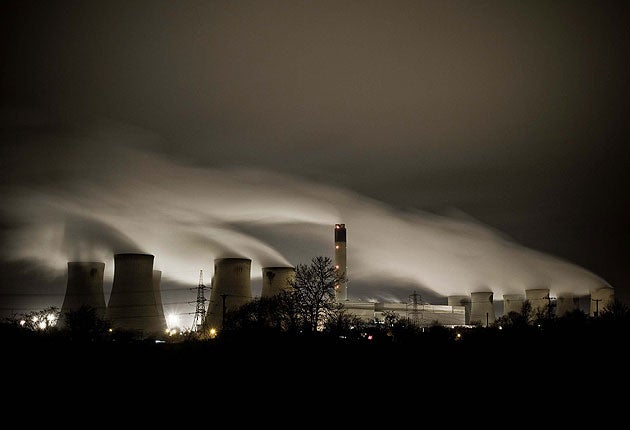Go-ahead for carbon-capture power stations

Your support helps us to tell the story
From reproductive rights to climate change to Big Tech, The Independent is on the ground when the story is developing. Whether it's investigating the financials of Elon Musk's pro-Trump PAC or producing our latest documentary, 'The A Word', which shines a light on the American women fighting for reproductive rights, we know how important it is to parse out the facts from the messaging.
At such a critical moment in US history, we need reporters on the ground. Your donation allows us to keep sending journalists to speak to both sides of the story.
The Independent is trusted by Americans across the entire political spectrum. And unlike many other quality news outlets, we choose not to lock Americans out of our reporting and analysis with paywalls. We believe quality journalism should be available to everyone, paid for by those who can afford it.
Your support makes all the difference.The Government today signalled the go-ahead for a new generation of coal-fired power stations - but insisted they would be made to reduce their carbon emissions.
Energy Secretary Ed Miliband said up to four new coal plants could be built before 2020, which he said was "important for our energy mix".
But he said at least a portion of each new power station must be fitted with the technology to trap and store their carbon dioxide underground.
His announcement to MPs followed a statement by Chancellor Alistair Darling in yesterday's Budget that there would be funding for up to four projects which demonstrate the new technology.
Today Mr Miliband said a levy to raise money for fitting the carbon capture and storage technology (CCS), which has not yet been tested at a commercial scale, would add an estimated 2 per cent on energy bills by 2020.
Mr Miliband said: "The era of new unabated coal has come to an end," as he announced all new coal fired power stations would be required to have CCS technology.
The new "clean" plants must demonstrate CCS on at least 300 MW output.
And if the technology works, the power stations would then have to have CCS fitted to cover 100 per cent of their energy output by 2025.
The Energy Secretary said the scheme was "the most environmentally ambitious of any country in the world, and puts us in a world leadership position on CCS and coal."
And he said: "There is no alternative to CCS if we are serious about fighting climate change and retaining a diverse mix of energy sources for our economy."
CCS technology traps the carbon dioxide - the most common greenhouse gas - which is created when fossil fuels are burnt, and stores it permanently underground.
It has the potential to cut the CO2 output from a power station by up to 90 per cent, although it reduces the efficiency of a plant due to the energy demands of trapping the carbon emissions.
Mr Miliband said some of the coal which would power the new plants would come from within the UK, while some would have to be imported.
Last year coal power stations provided 31 per cent of the UK's electricity, with around a third of the coal coming from the UK. In 2007 some 46 per cent of the coal used was imported from Russia.
Coal is the dirtiest of fossil fuels, but is expected to remain a widely-used source of energy because it is relatively abundant, cheap and easy to extract, transport and store.
To tackle the climate emissions of coal, Government is already running a competition to fund the building of one commercial scale, demonstration CCS plant, in which BP, E.ON, Peel Power and Scottish Power are the shortlisted candidates.
If, for example, E.ON were to get the go-ahead for a new coal-fired power station with CCS at Kingsnorth, Kent, the technology would trap emissions from around a quarter of the plant.
The competition has now been scaled up to as many as four power stations, while the regulations also unveiled today would prevent any new coal plants being built without the technology.
There is also funding available from the EU for such schemes.
It is hoped that the financial incentives and regulations will together ensure that the technology can be independently judged as economically and technically proven by 2020, with full installation then required within five years.
Today's announcement was welcomed by unions who said it had the potential to create thousands of jobs and avoid energy shortages in the coming years.
TUC general secretary Brendan Barber said: "This announcement finally puts serious money and political will behind clean coal.
"These proposals will place the UK at the forefront of the development of a technology and industry that can deliver really deep cuts in carbon across the globe.
"There will be financial costs but the longer term benefit of this move to the UK's economic growth and employment will be great."
Unite national officer Dougie Rooney said CCS presented the opportunity to create thousands of skilled jobs and secure the UK's energy supply, and urged the Government to ensure British workers were given the opportunity to work on the construction projects it would bring.
Gary Smith, GMB national secretary for the energy industries said developing clean coal technology was essential for the twin challenges of climate change and "keeping the lights on".
"We desperately need to get cracking on this initiative. We are staring into the precipice of an energy gap.
"Burning gas to generate electricity does not provide a long term solution," he said.
And he urged: "Any Government money awarded to support the development of carbon capture and storage must be tied to a commitment to support for the UK's indigenous coal.
"We have hundreds of years of coal reserves that will greatly assist when it comes to security of supply."
Join our commenting forum
Join thought-provoking conversations, follow other Independent readers and see their replies
Comments